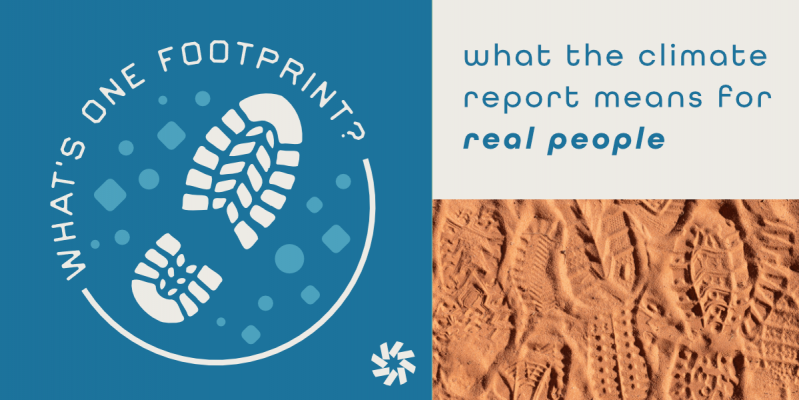
You stayed up later than you really wanted to, but you were finally starting to settle into bed. You were so tired that you forgot until just that moment that you didn’t turn off the light in the kitchen. Sure, you know it’s more environmentally friendly to turn your lights off when you’re not using them, but how much can you as one individual influence something as massive and dire as the climate crisis? Can’t the environment take one more for the team so that you don’t have to get back up?
The rollout of the United Nations’ Intergovernmental Panel on Climate Change (IPCC) climate report began in August with a global assessment of what the latest science says about climate change, and the message is troubling. Human influence continues to warm the atmosphere, ocean, and land, fueling record-breaking weather extremes, natural disasters, and ecological devastation. According to a 2019 Pew Research report, 79% of Americans agree that human actions contribute to climate change, yet it’s a significant challenge to inspire decisive collective action on the individual level partly because it’s so hard to see how turning off your lights, bringing reusable bags to the grocery store, and taking shared transit more often could be anything more than a drop in the bucket. So, let’s talk about why your choices and actions do actually matter and what you can do to make a real difference.
Be an influencer
It’s true that governments and industries have more power than individuals to make meaningful, large-scale changes that reduce greenhouse gas emissions and remove carbon dioxide from the atmosphere. But individuals have the power to influence governments and industries by voting, engaging policymakers, and contributing to the political will and consumer trends that make it a business and political imperative to do the right thing.
Whether attending city council meetings, installing solar panels on your home, or carpooling whenever you can, make climate-friendly choices in your daily life. Leading by example among your family, friends, and neighbors can have a cascading effect throughout your community. Talk to your coworkers and employer about ways to make your workplace more environmentally responsible until it becomes a priority. Do the same with your classmates, instructors, and administrators if you’re in school. Unemployed and out of school? Do you have access to social media where you can advocate for legislation you believe in? Southface Institute’s advocacy workshops can help. Assess where in your life you have influence and power and use it.
Green your career
If you work on buildings, getting trained and certified to assess and achieve sustainable, high-performance standards makes climate-friendly repairs, retrofits, and new construction more accessible in your community and makes you and your business more competitive as demand for these services continues to grow. Southface offers courses on RESNET’s Home Energy Rating System (HERS), ENERGY STAR-rated buildings, duct and envelope tightness (DET) verification, EarthCraft certification, and more.
Put your money to GoodUse
Southface has more than 40 years of expertise in sustainable building and development solutions that increase equity and strengthen communities. Our GoodUse program helps nonprofits improve the efficiency of their facilities so they can save on their utility bills and invest more in their core services. Our technical services team performs indoor air quality assessments. We consult and lead community engagement on clean energy plans for cities like Athens and Decatur in Georgia. Southface Sarasota provides hands-on education and research opportunities at the Florida House, the first green demonstration building open to the public in the nation. And that’s just scratching the surface.
If you have the means to contribute financially to important work that effectively reduces greenhouse gas emissions and environmental impact, your donation to our mission can go a long way toward changing our climate for the better without installing a single solar panel yourself.
Give it what you’ve got
The IPCC climate report makes it painfully clear that our planet is in crisis, but it ultimately ends on a hopeful note. By the end of the century, if our actions result in lower greenhouse gas emissions, scientists agree that it would strongly limit the frequency of extreme sea level events, heavy precipitation and flooding, and dangerous heat extremes while limiting the number of regions in which these disasters occur. But that won’t happen if we all stay the course. No matter how you’re able to spark change in your personal and professional life, it’s critical for us all to do what we can. Our planet needs all the help it can get.
Tips You Can Use Today
- Change your menu seasonally. Find out when different fruits and vegetables are in season in your area, plan your meals accordingly, and choose produce grown as close to you as possible. Tomatoes transported from thousands of miles away in the winter result in a lot more carbon emissions than your local spinach.
- Make your holidays bright when the time is right. If you decorate with lights, plug them into an outlet timer so they’re shining for fewer hours and only after dark. Switching to LED lights will reduce your energy consumption too.
———————————————————————————————————————————————-
You Are Here: Navigating the Latest Science on Climate Change
This is the second post in Southface Institute’s series on the rollout of the IPCC climate report, which you can learn more about in this introductory post. Follow along and learn what the latest science on climate change means for individuals like you and the governments, nonprofits, small businesses, schools, and corporations that impact our collective response to the climate crisis too.
———————————————————————————————————————————————-